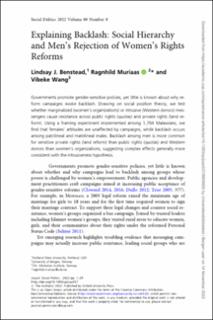Explaining Backlash: Social Hierarchy and Men’s Rejection of Women’s Rights Reforms
Journal article, Peer reviewed
Published version

Åpne
Permanent lenke
https://hdl.handle.net/11250/3034891Utgivelsesdato
2022Metadata
Vis full innførselSamlinger
- Department of Government [457]
- Registrations from Cristin [9791]
Originalversjon
Social Politics: International Studies in Gender, State and Society. 2022, jxac037. doi.org/10.1093/sp/jxac037Sammendrag
Governments promote gender-sensitive policies, yet little is known about why reform campaigns evoke backlash. Drawing on social position theory, we test whether marginalized (women’s organizations) or intrusive (Western donors) messengers cause resistance across public rights (quotas) and private rights (land reform). Using a framing experiment implemented among 1,704 Malawians, we find that females’ attitudes are unaffected by campaigns, while backlash occurs among patrilineal and matrilineal males. Backlash among men is more common for sensitive private rights (land reform) than public rights (quotas) and Western donors than women’s organizations, suggesting complex effects generally more consistent with the intrusiveness hypothesis.
